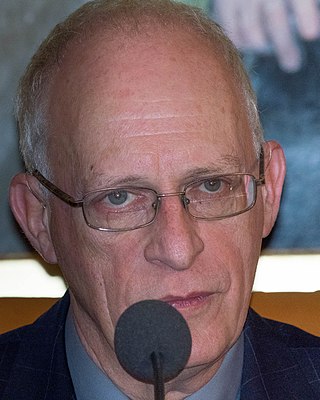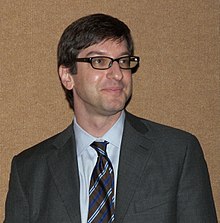
Richard Julius Herrnstein was an American psychologist at Harvard University. He was an active researcher in animal learning in the Skinnerian tradition. Herrnstein was the Edgar Pierce Professor of Psychology until his death, and previously chaired the Harvard Department of Psychology for five years. With political scientist Charles Murray, he co-wrote The Bell Curve, a controversial 1994 book on human intelligence. He was one of the founders of the Society for Quantitative Analysis of Behavior.

Matthew Joel Rabin is the Pershing Square Professor of Behavioral Economics in the Harvard Economics Department and Harvard Business School. Rabin's research focuses primarily on incorporating psychologically more realistic assumptions into empirically applicable formal economic theory. His topics of interest include errors in statistical reasoning and the evolution of beliefs, effects of choice context on exhibited preferences, reference-dependent preferences, and errors people make in inference in market and learning settings.

Sir Oliver Simon D'Arcy Hart is a British-born American economist, currently the Lewis P. and Linda L. Geyser University Professor at Harvard University. Together with Bengt R. Holmström, he received the Nobel Memorial Prize in Economic Sciences in 2016.

Olivier Jean Blanchard is a French economist and professor who currently serves as the Robert M. Solow Professor Emeritus of Economics at the Massachusetts Institute of Technology, and as the C. Fred Bergsten Senior Fellow at the Peterson Institute for International Economics. He was the chief economist at the International Monetary Fund from September 1, 2008, to September 8, 2015. Blanchard was appointed to the position under the tenure of Dominique Strauss-Kahn; he was succeeded by Maurice Obstfeld. According to IDEAS/RePEc, he is one of the most cited economists in the world.

Jean Tirole is a French economist who is currently a professor of economics at Toulouse 1 Capitole University. He focuses on industrial organization, game theory, banking and finance, and psychology. In particular, he focuses on the regulation of economic activity in a way that does not hinder innovation while maintaining fair rules.
Andrew Barnes Bernard is an American economist, currently the Kadas T'90 Distinguished Professor at the Tuck School of Business at Dartmouth College in Hanover, New Hampshire, United States. He has been on the faculty at Tuck since 1999. He received his A.B. from Harvard and his Ph.D. from Stanford University in economics in 1991 and was on the faculty at MIT and Yale School of Management prior to coming to Tuck.
James Michael "Jim" Poterba, FBA is an American economist who is the Mitsui Professor of Economics at the Massachusetts Institute of Technology, and current NBER president and chief executive officer.
Frederic Michael Scherer is an American economist and expert on industrial organization. Since 2006, he continues as a professor of economics at the JFK School of Government at Harvard University.

Jason Furman is an American economist and professor at Harvard University's John F. Kennedy School of Government and a nonresident senior fellow at the Peterson Institute for International Economics. On June 10, 2013, Furman was named by President Barack Obama as chair of the Council of Economic Advisers (CEA). Furman has also served as the deputy director of the U.S. National Economic Council, which followed his role as an advisor for the Barack Obama 2008 presidential campaign.

Alok Bhargava is an Indian econometrician. He studied mathematics at Delhi University and economics and econometrics at the London School of Economics. He is currently a full professor at the University of Maryland School of Public Policy.
Christopher Sandy Jencks is an American social scientist.
Drew Fudenberg is a Professor of Economics at MIT. His extensive research spans many aspects of game theory, including equilibrium theory, learning in games, evolutionary game theory, and many applications to other fields. Fudenberg was also one of the first to apply game theoretic analysis in industrial organization, bargaining theory, and contract theory. He has also authored papers on repeated games, reputation effects, and behavioral economics.

Christopher F. Chabris is an American research psychologist, currently Senior Investigator (Professor) at Geisinger Health System, visiting fellow at the Institute for Advanced Study in Toulouse, France, and associate professor of Psychology and co-director of the Neuroscience Program at Union College in Schenectady, New York. He is best known as the co-author of the popular science book The Invisible Gorilla, which presents the results of research into attention and other cognitive illusions.
David S. Scharfstein is the Edmund Cogswell Converse Professor of Finance and Banking at Harvard Business School.
William Lazonick is an economist who studies innovation and competition in the global economy.

David H. Autor is an American economist, public policy scholar, and professor of economics at the Massachusetts Institute of Technology (MIT), where he also acts as co-director of the School Effectiveness and Inequality Initiative. Although Autor has contributed to a variety of fields in economics his research generally focuses on topics from labor economics.
Glenn David Ellison is an American economist who is the Gregory K. Palm Professor of Economics at the Massachusetts Institute of Technology (MIT) and an Elected Fellow of the Society for the Advancement of Economic Theory and American Academy of Arts & Sciences. He is the father of Caroline Ellison, an American felon and former CEO of Alameda Research.
Roland Bénabou is a French economist, who is currently the Theodore A. Wells '29 Professor of Economics and Public Affairs at Princeton University. He is also a research associate at the Collège de France.
The 2021 Nobel Memorial Prize in Economic Sciences was divided one half awarded to the American-Canadian David Card "for his empirical contributions to labour economics", the other half jointly to Israeli-American Joshua Angrist and Dutch-American Guido W. Imbens "for their methodological contributions to the analysis of causal relationships." The Nobel Committee stated their reason behind the decision, saying:
"This year's Laureates – David Card, Joshua Angrist and Guido Imbens – have shown that natural experiments can be used to answer central questions for society, such as how minimum wages and immigration affect the labour market. They have also clarified exactly which conclusions about cause and effect can be drawn using this research approach. Together, they have revolutionised empirical research in the economic sciences."
The 2019 Nobel Memorial Prize in Economic Sciences was awarded jointly to the economist couple Abhijit Banerjee, Esther Duflo-Banerjee and their colleague Michael Kremer "for their experimental approach to alleviating global poverty". Banerjee and Duflo are the sixth married couple to jointly win a Nobel Prize. The press release of the Royal Swedish Academy of Sciences noted:
"The research conducted by this year's Laureates has considerably improved our ability to fight global poverty. In just two decades, their new experiment-based approach has transformed development economics, which is now a flourishing field of research. They have laid the foundations of the best way to design measures that reduce global poverty"









